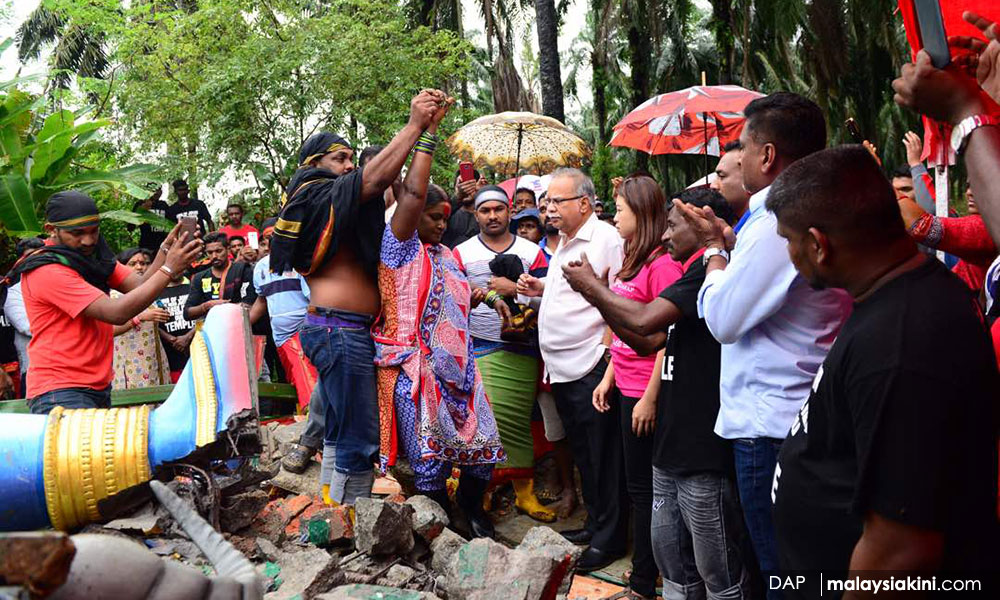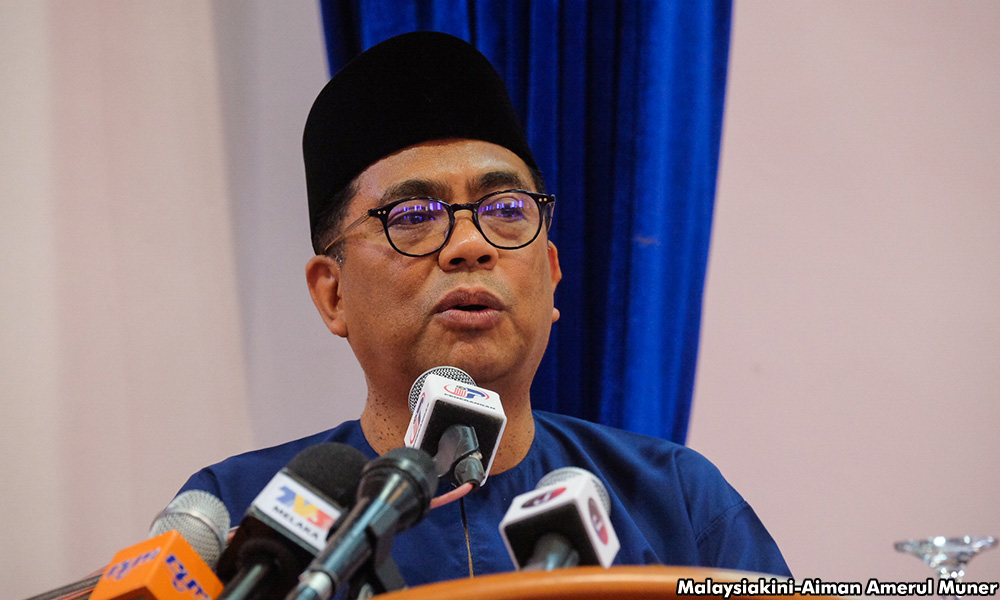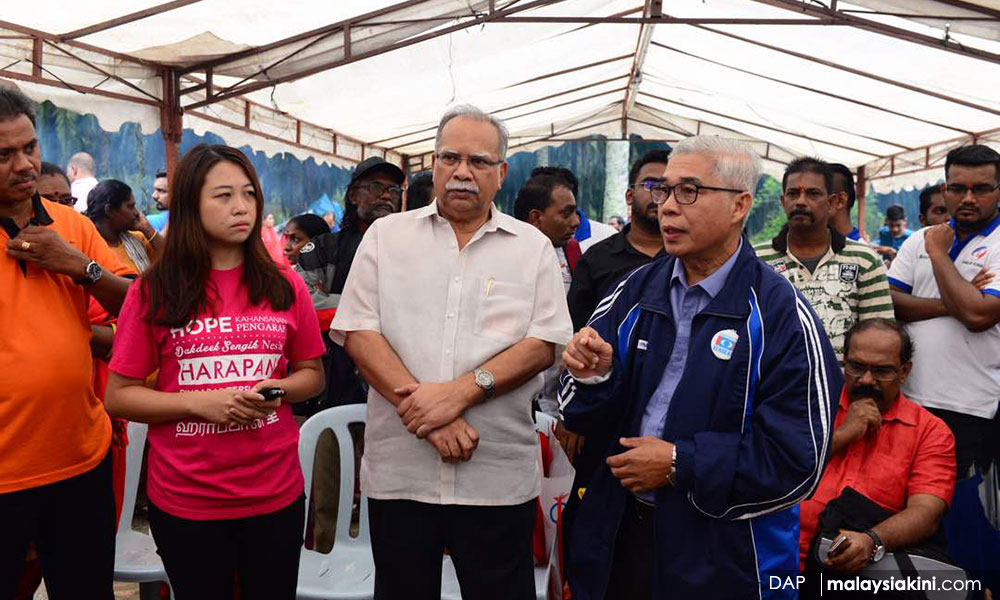ADUN SPEAKS | The destruction of places of worship is an affront to the decency and wellbeing of Malaysians.
No places of worship, whether illegal or not, should not be subjected to such a demolition that strikes at the heart of the religious and spiritual identity of Malaysians.
The recent demolition of a Hindu temple in Seri Alam, Johor shows that there are forces at work to undermine the fundamental provisions of the nation's constitution that safeguard religious freedom.
I hardly expected temple demolitions to take place in the state of Johor, a state that has better race and religious relations among different ethnic groups than many others.
In this regard, at least in recent years, Johor royalty, and in particular, Sultan Ibrahim Sultan Iskandar, have taken proactive measures to keep the state free from religious and racial extremism.
This is the reason why I was surprised to hear about the demolition of the 80-year old Hindu temple, Sri Sakthi Sri Sinna Karuppar Alayam.
I visited the temple site yesterday. Later the local state assemblyperson for Johor Jaya Liow Cai Tung and PKR Johor state chairperson Hassan Karim joined me.

The demolition was drastic and extreme, and was carried out with the assistance of more than 300 policemen and members of the Federal Reserve unit. The combined effect of the demolition exercise was total – the main deities and the temple itself were destroyed beyond recognition.
A 50-year-old mango tree was saved simply because of its size and the inability of the bulldozers to uproot it.
I understand that the temple committee was taken by surprise by the demolition itself. In some earlier communications with the landowner, who is a foreign national, the temple committee asked for the piece of land on which the temple was situated.
But then there was no news forthcoming from the landowner except for the sudden turn of events leading to the demolition. In fact, the demolition squad moved in with the assistance of the police without the knowledge of the devotees. Once they moved in, they locked the gates.
It is believed that the landowner took a court order for the eviction of the temple occupants last year, but it only enforced during the demolition exercise. Under normal circumstances, even if the temple is illegal, and if the land is situated in an urban area, the landowner not only has to obtain the eviction order, but also the demolition permit from local authorities.
However, the eviction order itself does not permit the owner to demolish buildings or any other structures. The police might have been roped in on the basis of the eviction order, but I am not sure whether the landowner obtained the permission of the local authorities for the demolition.
The illegality of the non-Muslim places of worship in the country is not a big deal. In fact, I would say that the majority of these places are probably illegally squatting on government and private lands.
Perhaps with the exception of Penang or Selangor, many of the states in the peninsular do not have the provision of land meant for non-Muslim places of worship integrated in their local government plans. This would largely explain why many non-Muslim places of worship are considered "illegal" and subject to eviction and demolition.
The Penang government came out with the policy in 2008 that no places of worship would be demolished without the approval of the chief minister. Moreover, given the provision setting aside land for non-Muslim places of worship, the Penang government has been able to resolve disputes arising from arising from the "illegality" of non-Muslim places of worship.
Moreover, developers and landowners in Penang understand that demolishing a place of worship is not a simple legal matter, it is complicated process. Thus, no developer wishing to develop a land on which there is place of worship would want to antagonise the standing government by going for demolition. It is simply not worth it.

Johor Menteri Besar Mohammed Khaled Nordin (photo) issued a statement after the demolition saying that he regretted the action of the developer. He also said that the state government offered an alternative piece of land that was rejected by the temple committee.
However, upon verification it was found that there was no such offer from the state government. Given the fact, that the temple-site is on a 200-acre land, I don't see why the state has to offer land for moving the temple without in the first instance asking the landowner to provide the land.
A day after the demolition, apparently Johor MIC leaders visited the temple site and promised the temple committee that the they would ensure that the temple gets ownership of the existing land.
Whether this is promise to contain the MIC's political fallout from the demolition or whether it is genuine remains to be seen. However, given the past empty promises of the MIC on matters concerning the Indian community, those who were gathered at the temple site should not be too confident that what was promised the day after demolition will be delivered on.
While the devotees might have been caught unaware by the demolition, I am not sure why the members of the Johor state government, particularly state MIC leaders, were not in the know.
If Johor MIC leaders had been proactive in representing the Indian community, I think that the temple demolition could have been averted.
The MIC leaders being reliant on Umno for political and career opportunities have betrayed the Indian community to the extent that their places of worship cannot be safeguarded anymore.

I am proud that Liow took the menteri besar to task for not being able to safe the temple on humanitarian grounds.
What happened was not a mere Hindu temple destruction, but a larger issue of ethnic and racial discrimination that is taking place in the BN administration. The ruling coalition has reached a point that it cannot ensure the constitutional protection of the basic fundamental rights of its citizens.
P RAMASAMY is Penang Deputy Chief Minister II and Perai state assemblyperson.
The views expressed here are those of the author/contributor and do not necessarily represent the views of Malaysiakini.

